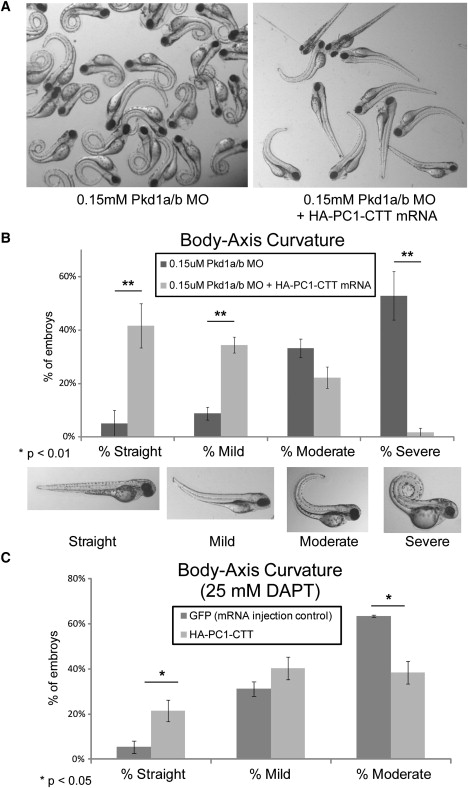Fig. 7
Both Morpholino Knockdown of Pkd1a/b and Treatment with DAPT Result in Dorsal Axis Curvature in Zebrafish Embryos, which Can Be Rescued by Expression of the PC1-CTT (A) Morpholinos corresponding to the zebrafish Pkd1a and Pkd1b PC1 genes were injected into zebrafish embryos at the one- to two-cell stage to impair expression of the two Pkd1 genes. The embryos were subsequently injected with 300 nM of mRNA encoding HA-PC1-CTT, where indicated, and imaged at 3 days post fertilization (dpf). (B) Embryo phenotypes were scored based on the degree of dorsal tail curvature: mild (<90°), moderate (>90°), and severe (tail tip crossing the body axis). The data represent the averages of three separate experiments; error bars represent SEM. (C) Embryos were injected with 300 nM mRNA encoding either GFP (control) or HA-PC1-CTT at the one- to two-cell stage, then immersed in embryo media containing 25 μM DAPT, imaged at 3 dpf, and scored for the tail curvature phenotype.
Reprinted from Developmental Cell, 22(1), Merrick, D., Chapin, H., Baggs, J.E., Yu, Z., Somlo, S., Sun, Z., Hogenesch, J.B., and Caplan, M.J., The γ-Secretase Cleavage Product of Polycystin-1 Regulates TCF and CHOP-Mediated Transcriptional Activation through a p300-Dependent Mechanism, 197-210, Copyright (2012) with permission from Elsevier. Full text @ Dev. Cell

